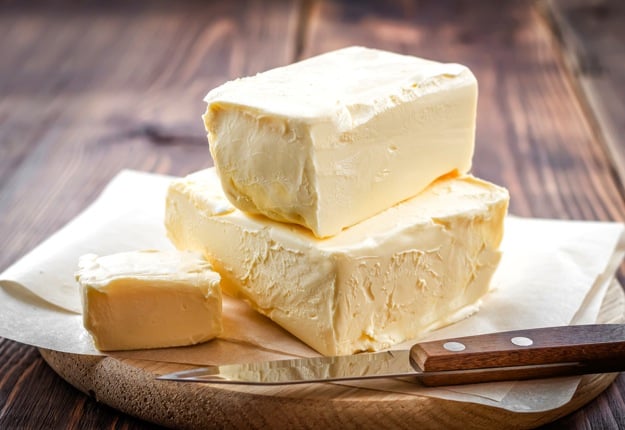It’s a question that comes up time and time again, which is better butter or margarine?
It’s also a question that for some reason insights a lot of emotion – unlike the question of tea verse coffee, people seem to take a firm stance on either side of this debate and will passionately argue their case.
Let’s take a little more objective look at this issue and see if we can’t come to a little less emotive, more rational conclusion. Let’s compare butter vs margarine:
Butter
- Is ‘natural,’ containing only cream, water and salt
- It contains small amounts of fat soluble vitamins A, D and E
- It is about 50% saturated fat, which can raise cholesterol levels and ultimately contribute to heart disease
- It is an animal based product (which has ethical considerations for some)
- It tastes pretty good
Margarine
- It is ‘processed,’ contains a range of ingredients, often including preservatives
- It often has fat soluble vitamins added
- Some contain plant sterols that actively lower cholesterol
- It contains about 50% unsaturated fat and about 20% saturated fat, so is considered healthier for your heart
- Most margarine these days contain only very small amounts of trans fats (choose products labelled 0.1g per 100g or <0.1%)
- It is plant based, usually being derived from canola, olive or sunflower, which are often mixed with vegetable fats
- It spreads really easily so you can better control your portion size (and use it straight from the fridge)
So as you can see there are pros and cons for both butter and margarine that ultimately means the choice is yours depending on your priorities and in consideration of your overall diet.
Neither butter nor margarine is necessary in your diet so you could quiet easily choose not to use either and opt to spread your sandwich or toast with avocado, hummus, a nut butter or ricotta.
In baking you could try replace some or all of the butter or margarine with banana or yoghurt.
Don’t forget that both butter and margarine are considered ‘discretionary’ or ‘extra’ foods and the overall quality of our diet is far more heavily influenced by our consumption of foods within the core food groups, like fruits, vegetables, whole grains, nuts, seeds, lean meats, legumes, milk, cheese and yoghurt.




















7:17 pm
2:15 pm
1:03 pm
1:14 pm
10:08 pm
8:19 am
10:26 pm
5:18 pm
2:50 pm
8:44 am
5:50 pm
-

-
-
mom94125 replied
- 19 Oct 2015 , 2:08 pm
Reply5:33 pm
5:16 pm
2:03 pm
2:42 pm
11:24 pm
9:13 pm
8:39 am
8:49 am
1:46 am
- 1
- 2
- …
- 5
- »
Post a commentTo post a review/comment please join us or login so we can allocate your points.